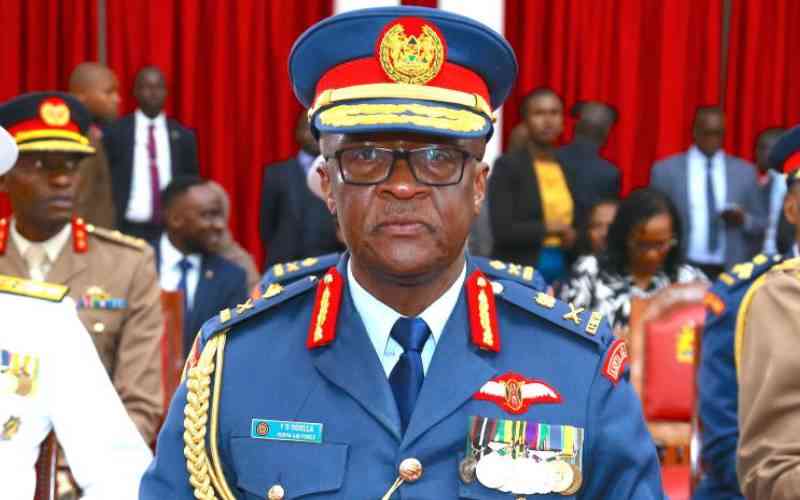By Edwin Sifuna
The Westgate siege remains fresh in the minds of Kenyans, not just because of the untold horror visited on innocent people, but also because the terrorists keep reminding us every so often just how vulnerable we have become.
We are nothing but sitting ducks to them and hardly a month will go by without an explosion going off somewhere or gunshots renting the air. From our mega shopping malls to local eateries, churches and matatus, it seems we are no longer safe anywhere.
There were terror attacks prior to the Westgate siege but the terrorists seem to have been galvanized and emboldened after the siege.
The most obvious explanation for this, at least in my mind, must be the incoherent and seemingly uncoordinated response we have seen from the government. Months later, we are still groping in the dark, not knowing what hit us.
Are we really being fair to those who lost their lives in the mall and their families by the nonchalant way we have gone about trying to understand the systemic security failures leading up to the siege? If we do not fully understand and address the failings in our security and intelligence apparatus leading up to that fateful day, can we really confidently declare that similar attacks will not recur?
The National Assembly recently rejected a report prepared jointly by the House’s own departmental committees on Defence and Foreign Relations and Administration and National Security. The two committees were castigated by their colleagues for doing a “shoddy Job” and wasting taxpayer money without telling Kenyans the truth of what happened at Westgate. This was indeed a damning indictment of the investigative capabilities, independence and objectivity of house committees.
As things stand now Kenyans are no closer to knowing the truth about Westgate although there remains one avenue that could yet unearth the truth, but on which the Jubilee Government has remained curiously silent and that is the establishment of a Commission of Inquiry.
Under Section 3 (1) of the Commissions of inquiry Act (Cap 102 Laws of Kenya), the President has the power to set up a commission to inquire into any matter into which an inquiry would, in his opinion, be in the public interest.
The problem with this law as it is currently worded is that it leaves it to the President alone to determine when it is advisable to set up commissions of inquiry and what matters are in the interest of the public to inquire into. I do not want to speculate on why the President has not exercised his discretion under this law yet but the good citizens of this country who are most in danger of falling victim to terror attacks cannot sit by and continue waiting for his action.
When one considers the kind of matters for which commissions of inquiry have been set up in the past, one fails to understand why Westgate would not rank as a matter grave enough to warrant similar treatment. In 1994 for instance, then President Daniel arap Moi set up a commission to inquire into alleged devil worship activities in schools! We had the Muthoga Commission after the 2003 Busia plane crash in which the number of those killed was nowhere near those massacred at Westgate.
It is amazing that in an era of decentralisation and devolution of power and state functions we have relics of the past like the Commissions of Inquiry Act still forming part of our laws!
With the coming into force of the new Constitution in 2010 Kenyans expressed a desire to part with the old order where all power was wielded and exercised by a centralised presidency and all existing laws were to be updated to be in line with this new era of public participation, decentralisation and devolution.
Article 94 (2) of our Constitution provides that Parliament represents the will of the people and exercises their sovereignty. Shouldn’t parliament then, and not the presidency, be the one to determine which matters would be in the interest of the public to be inquired into?
I believe it is time to amend the Commissions of Inquiry Act to give the citizens of this country the power, through their elected representatives, to find answers to questions which are of importance to them.
Stay informed. Subscribe to our newsletter
If indeed our Members of Parliament are serious about finding answers on the failings within our institutions that led to the mass murder of innocent men women and children at Westgate then I challenge them bring to the floor of the house an amendment to Cap 102 that would give the House power to establish or require the President to establish commissions of inquiry whenever Parliament so resolves. This would introduce some level of much needed objectivity in the process.
Such a Bill must comprehensively address the issues that have dogged Commissions of Inquiry in the past, including insulating them from political interference and manipulation. It must also provide for the manner in which members of such commissions are appointed, their qualifications and skills, the setting of terms of reference of the commissions and presentation of their reports to the house for transparency and accountability.
There are a number of studies and reports that highlight the challenges faced by previous commissions of inquiry in Kenya, and their effectiveness or otherwise as tools of unearthing answers in the public interest. These should make the work light for any Member of Parliament who answers the call to take up this cause.
We could make the decision to do this for the Westgate victims and for ourselves as a country or sit by and wait for the President to be sufficiently moved, all the while not knowing when it will be our turn to grace the terror victims lists.
 The Standard Group Plc is a
multi-media organization with investments in media platforms spanning newspaper
print operations, television, radio broadcasting, digital and online services. The
Standard Group is recognized as a leading multi-media house in Kenya with a key
influence in matters of national and international interest.
The Standard Group Plc is a
multi-media organization with investments in media platforms spanning newspaper
print operations, television, radio broadcasting, digital and online services. The
Standard Group is recognized as a leading multi-media house in Kenya with a key
influence in matters of national and international interest.
 The Standard Group Plc is a
multi-media organization with investments in media platforms spanning newspaper
print operations, television, radio broadcasting, digital and online services. The
Standard Group is recognized as a leading multi-media house in Kenya with a key
influence in matters of national and international interest.
The Standard Group Plc is a
multi-media organization with investments in media platforms spanning newspaper
print operations, television, radio broadcasting, digital and online services. The
Standard Group is recognized as a leading multi-media house in Kenya with a key
influence in matters of national and international interest.







